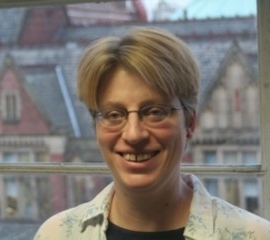
During the Fall of 2010, Claire Honess, Co-Director of the Leeds Centre for Dante Studies, is spending a semester at Notre Dame as a Visiting Scholar, thanks to the award of a Study Abroad Fellowship by the Leverhulme Trust in London.
Dr Honess graduated in 1989 with a degree in Italian and French from the University of Reading. She went on to do a PhD on the image of the city in Dante’s writing, and her book on the same subject, From Florence to the Heavenly City: The Poetry of Citizenship in Dante, was published by Legenda (Oxford) in 2006. Her translation of and commentary on four of Dante’s Latin letters on political themes was published in 2007, and her principal research interest continues to be Dante’s political thought and particularly the ways in which Dante uses political ideas and imagery in a poetic context. She has also published on modern Italian literature and on the teaching of Italian, and she is Senior Editor of the journal The Italianist. She has taught at Leeds since 2003, having previously held posts at the Universities of London and Reading. Together with her colleague, Matthew Treherne, she founded the Leeds Centre for Dante Studies in 2007.
The Centre promotes the study of Dante from a variety of disciplinary and methodological perspectives through a dynamic programme of research, through support for the study of Dante at undergraduate and postgraduate levels, and through its public outreach activity. The Centre’s current primary research theme is “Dante’s Theology”, a subject on which it held an international workshop during the Spring of 2009 and on which a volume of essays is currently in preparation. It also hosts regular Visiting Fellows, who both contribute to the research activities of the Centre and engage with students at all levels. Notre Dame Professors Moevs and Montemaggi were Visiting Fellows in the Centre in 2007 and 2008 respectively, as well as having participated in the 2009 workshop . Regular student-focused events in the Leeds Centre for Dante Studies include annual study days for undergraduate students in the UK and Ireland (held in Leeds and Cork) and an annual national undergraduate essay prize, while the Centre also aims to bring Dante to the broadest possible public: its podcast – the first English-language podcast devoted to Dante – makes it possible to access short episodes exploring aspects of Dante’s work from across the world, and it has also organised public lectures, a concert of poetry-readings, music and art, and an exhibition of editions of Dante held in the Brotherton Library in Leeds.
During her stay at Notre Dame, Dr Honess will be working on a book with the provisional title, Dante and the Poetics of Politics. The book aims to analyse Dante’s works within the context of a broad understanding of ‘political’ poetry as poetry which addresses its readers in their social and public context. Through an investigation of the many different ways in which political ideas could be given expression in the Middle Ages and in the texts – both Classical and Christian – which provided medieval authors with their principal sources, the book will suggest some points of contact between these political traditions and Dante’s works. In particular, she will be working on Dante’s vernacular poetic writings prior to the Commedia, to suggest ways in which the Vita nova and the Convivio may be read as ‘political’ texts and as stepping-stones to the poetic and political masterpiece that is the Commedia.
Alongside her own research, Dr Honess will be working to enhance the collaborative links between the Leeds Centre for Dante Studies and the Devers Program in Dante Studies at Notre Dame. In particular, she will be working to set up a programme of joint video-conferenced seminars for undergraduates in both institutions, which will help to extend the existing research links and strengths into learning opportunities for students, and to record a new series of Dante podcasts by Notre Dame Faculty, which will add an international voice to the Leeds podcast, enhancing its value as a learning resource and ensuring that the fruits of the Leeds/Notre Dame collaboration are made available to as wide an audience as possible.
Dr Honess said: “I am thrilled to have the opportunity to spend a semester at Notre Dame and to be able to benefit from the wealth of expertise and resources available here. I am hugely grateful to the Department of Romance Languages and Literatures for hosting me, and to the Leverhulme Trust for funding my visit”.